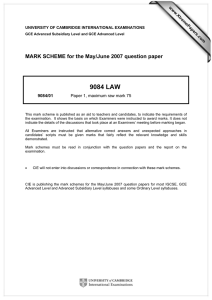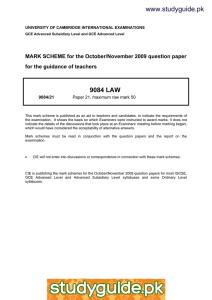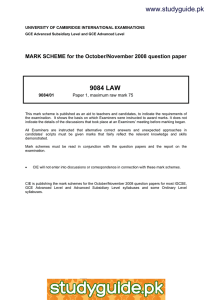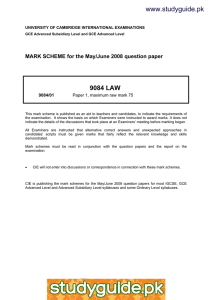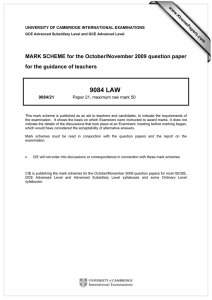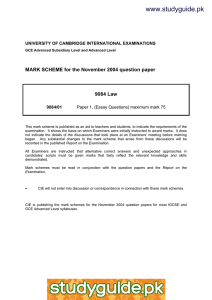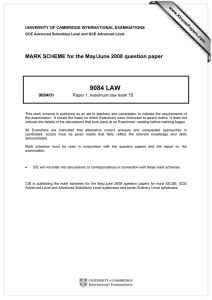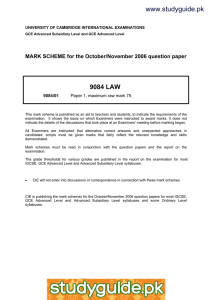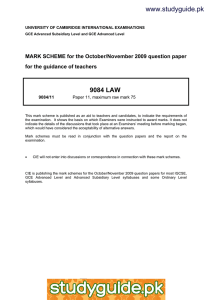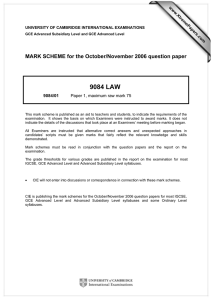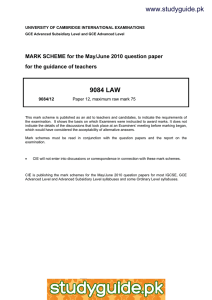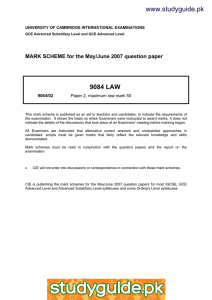www.studyguide.pk 9084 LAW
advertisement
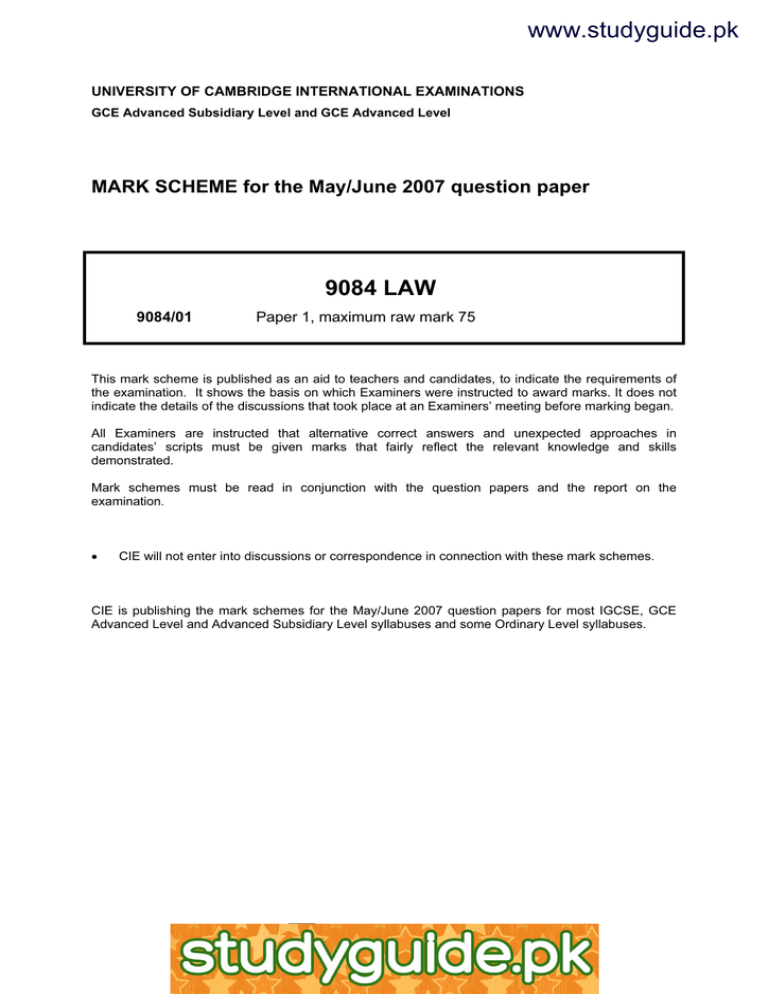
www.studyguide.pk UNIVERSITY OF CAMBRIDGE INTERNATIONAL EXAMINATIONS GCE Advanced Subsidiary Level and GCE Advanced Level MARK SCHEME for the May/June 2007 question paper 9084 LAW 9084/01 Paper 1, maximum raw mark 75 This mark scheme is published as an aid to teachers and candidates, to indicate the requirements of the examination. It shows the basis on which Examiners were instructed to award marks. It does not indicate the details of the discussions that took place at an Examiners’ meeting before marking began. All Examiners are instructed that alternative correct answers and unexpected approaches in candidates’ scripts must be given marks that fairly reflect the relevant knowledge and skills demonstrated. Mark schemes must be read in conjunction with the question papers and the report on the examination. • CIE will not enter into discussions or correspondence in connection with these mark schemes. CIE is publishing the mark schemes for the May/June 2007 question papers for most IGCSE, GCE Advanced Level and Advanced Subsidiary Level syllabuses and some Ordinary Level syllabuses. www.xtremepapers.net www.studyguide.pk Page 2 1 Mark Scheme GCE A/AS LEVEL – May/June 2007 Syllabus 9084 Paper 01 Identify the legal personnel you would find in the Magistrates’ Court and consider critically the part that they play in criminal proceedings. The question requires identification of the following: • bench of lay magistrates or • District Judge and their assessment of evidence. They listen to the facts and pass sentence, reach a verdict on or adjourn for a variety of reasons e.g. committal proceedings, later sentencing exercise, trials etc. • prosecutor – generally a CPS lawyer, whose role will be to present facts of cases to the court and to make appropriate applications where the case cannot be finalised. • defence solicitor or counsel – representing his/her client; seeking adjournment for further instructions or for trial; mitigation. • clerk – advising the justices in points of law. Generally controlling proceedings. • some mention of the difference between lay justices and district judges. Candidates might also mention the problems faced by unrepresented defendants; and qualifications and training of the advocates and the clerk. Any sensible criticism of the proceedings, e.g. over-officious clerks, overworked prosecutors, the shortcomings of lay magistracy and the greater speed and cynicism of the District Judge – should be rewarded. Max 15 marks where only lay magistrates are discussed. Max 18 where Magistrates and the clerk are mentioned. Max 18 for a good answer with just one type of magistrate but focusing on criminal proceedings. Max 21 for very good answer with just one type of magistrate and mention of the clerk but focusing on criminal proceedings. 2 ‘It seems to me that, in such circumstances, the fact that a detention and training order is not available indicates that Parliament intended that generally a non-custodial sentence should be passed.’ R v Southampton Youth Court ex parte W (2002). What does the above observations tell us about the role of the judge in the interpretation of statutes? Emphasis should be on the role of the judge in interpreting statutes and whether it is his task to look beyond the literal meaning of the Act to the parliamentary thinking that lies behind it. Inevitably, candidates then need to consider the basis three rules of interpretation, together with the other aids and presumptions available. They should further consider, via Pepper v Hart and the European approach, whether it is right for the judge to adopt a purposive approach to the statutory problem before him/her. © UCLES 2007 www.xtremepapers.net www.studyguide.pk Page 3 3 Mark Scheme GCE A/AS LEVEL – May/June 2007 Syllabus 9084 Paper 01 To what extent would you agree that the principle of stare decisis has handicapped the development of English Law? A straightforward question, in which candidates should outline the hierarchical structure of the courts and the system of binding precedent, before going on to consider more critically any issues of tension between the courts/uneven development of justices, and, on the other hand, the stability and certainty that such a system brings out. Better answers ought to consider such topics as the impact or otherwise of the 1996 Practice Direction, the line of negligence cases deriving from Donoghue v Stevenson and the approach taken by Lord Denning in the Court of Appeal. The need for greater certainty in criminal cases should also be considered. 4 ‘The development of equity has made the law more fair.’ Discuss. A historical account of equity is necessary as a basis for argument – origins, inadequacy of common law remedies etc. – but should not be laboured. Maximum of half marks if there is nothing else. Some discussion of the principle of fairness should be developed, in particular the equitable maxims and their application, q.v D & C Builders v Rees, Leaf v International Galleries Ltd et al. One would hope also to see some consideration of the development of rights in law between mortgager/mortgagee, trusts, promissory estoppel and the modern developments of Anton Piller orders, Mareva Injunctions and their recent replacements. Max 15 marks for a purely historical approach to the development of equity. Max 19 for lack of breadth and lack of supporting case law. 5 Leanne, who is 17, has been convicted of unlawful wounding at the Barchester Youth Court. What matters should the Magistrates consider before deciding upon her sentence? Critically evaluate the adequacy of the range of sentences open to them? The key points are: • that Leanne is a youth and • that she has been convicted after trial. This rules out the possibility of a Referral Order, but all other Youth sentencing options are open to them, from a Detention and Training Order of up to two years (no discount here), down through the various community orders, Attendance Centre, fine and discharge. Those who mention Compensation Orders or Parenting Orders should be rewarded. Candidates need to discuss the general sentencing principles and the Youth Court’s greater emphasis upon rehabilitation than retribution or deterrence. The magistrates will consider the points raised in Leanne’s pre-sentence report, as prepared by the Youth Offending Team, covering such things as her record, her attitude to the offence, home and educational circumstances and likelihood of re-offending. They will also listen to the facts as found by the court and to mitigation from her own solicitor. Max 15 exclusive emphasis on principles of sentencing and some sentencing options. Max 11 for answers concentrating purely on the principles of sentencing. © UCLES 2007 www.xtremepapers.net www.studyguide.pk Page 4 6 Mark Scheme GCE A/AS LEVEL – May/June 2007 Syllabus 9084 Paper 01 Critically analyse the statutory powers of the police in England and Wales. Candidates should deal with the fundamental powers as regulated by the Police and Criminal Evidence Act 1984. An acceptable answer would cover a selection from the following, with appropriate reward being given for the level of critical analysis offered: • power of arrest • power to stop and search • power to detain, question and interview following arrest • power to enter and search premises • power to stop and report for summons Very good answers would consider the safeguards built in to the P.A.C.E. codes of practice; the right of individuals not to answer questions in interview or stand on identification parades (and the inferences drawn from such refusal); the right to have a solicitor etc. Max 19 for answer concentrating on a-c with no extra detail on PACE ore relevant issues. A conclusion should be reached. © UCLES 2007 www.xtremepapers.net
